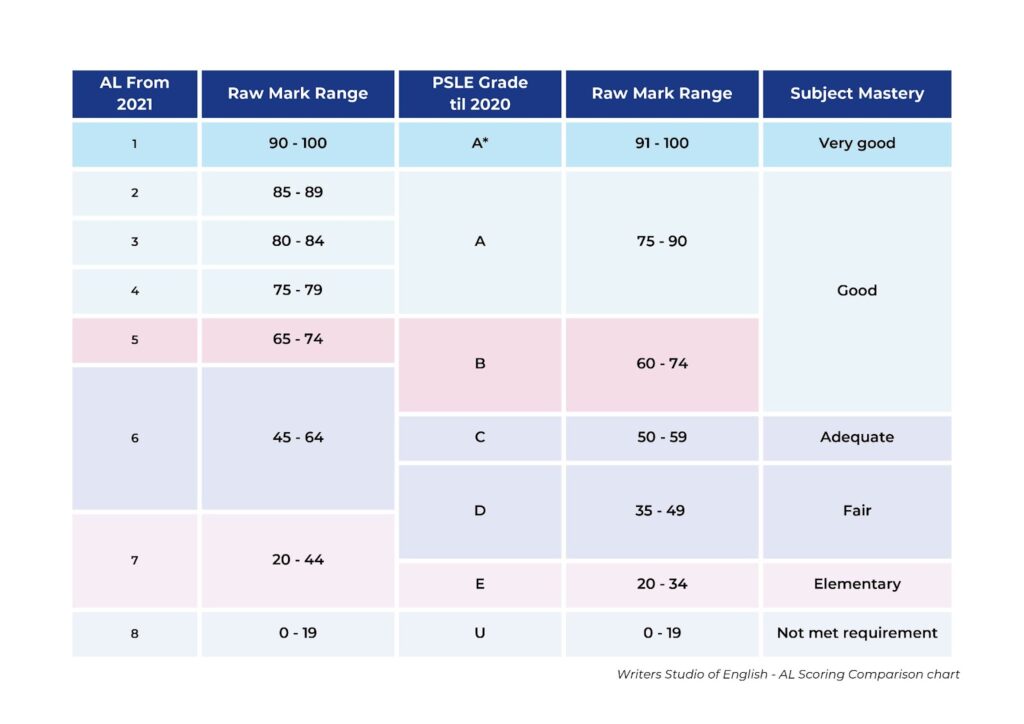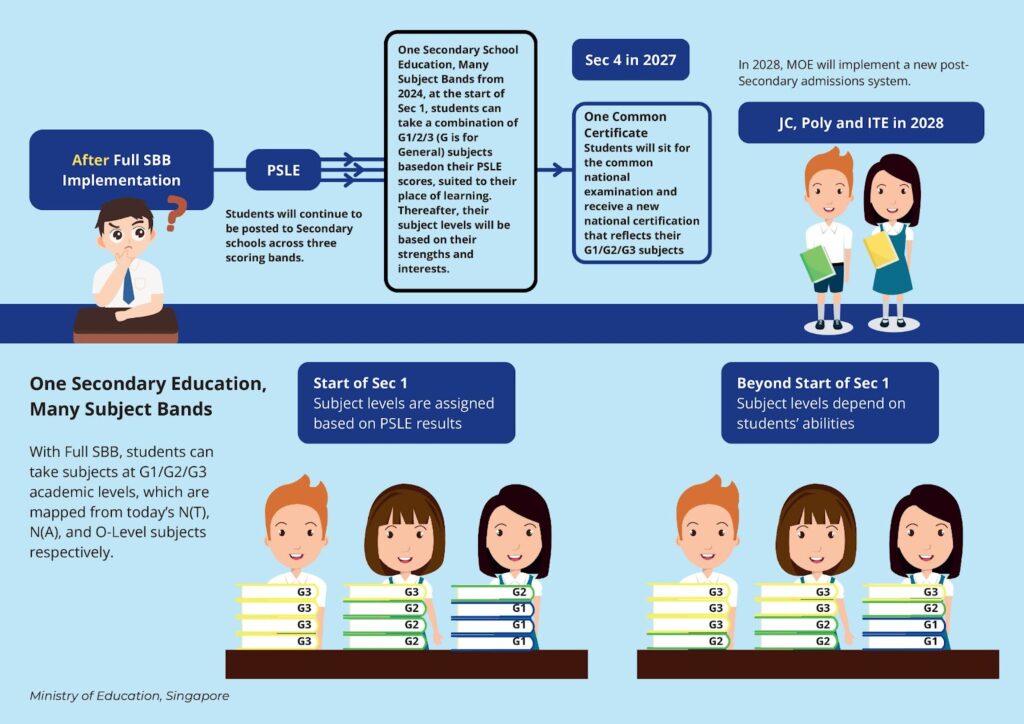
22 June 2024
PSLE’s New AL Scoring System: A Guide for Parents in Singapore
Impact of PSLE’s New Achievement Level (AL) Scoring System on You and Your Child
Since 2021, the PSLE scoring system has undergone a major overhaul, moving away from the old T-Score to a new system based on Achievement Levels (ALs). Now, each subject is graded on a scale of eight Achievement Levels (ALs), which groups students with similar performances together. This has essentially replaced the highly specific T-Score with broader scoring bands. The Ministry of Education (MOE) made these changes not only to simplify the process but also to focus more on individual achievements rather than how children compare to their peers. This means less stress over fine differences in scores at a young age.
However, figuring out this new system and making use of it to realistically evaluate your child’s capabilities and make informed decisions about school choices can be daunting.
Implications of the New AL Scoring System
Comparing the new AL scoring system and the old T-score system (refer to chart 1), one of the key differences is how the previous A grade has been broken down to three levels in the new AL system—AL2, AL3, and AL4—giving a more detailed view of your child’s performance. This setup helps students aim for manageable, incremental improvements.
For instance, moving from AL4 to AL3 feels much more attainable than the big jumps needed in the old T-score system. Moreover, this helps identify a student’s strengths and weaknesses more clearly, allowing for focused improvement in specific areas or subjects. So make use of the AL scoring system to help your child set intermediate goals and monitor their progress.

Another important difference is the broadening of AL 5, 6 and 7, designed to allow academically average students to achieve a total aggregate that is more indicative of their academic ability and performance so that when they enter secondary school they will be assigned to each subject according to their abilities under the full Subject-Based Banding (SBB) scheme starting this year (2024). This scheme provides a more dynamic selection of subjects for students throughout their secondary school years so that they can excel in particular areas (refer to chart 2).

Navigating Education Choices with PSLE’s New AL Scoring System
With the new AL scoring system, you have several choices to consider when guiding your child through primary and secondary education.
1. School Selection
You can choose secondary schools based on the AL cut-off points, which reflect the range of scores needed for admission. Schools are less finely differentiated under the AL system, allowing for a broader selection based on your child’s total score.
2. Subject Banding
With the Full SBB scheme, you can support your child in choosing subjects at different levels (G1, G2, G3) according to his or her abilities, which is determined by their AL scores. This allows for a more customised educational path.
3. Indicative Cut-Off Points
The Ministry of Education provides indicative AL cut-off points for secondary schools to help parents and students familiarise themselves with the new system and make informed decisions.
4. Holistic Considerations
Beyond academic scores, you should evaluate schools on factors like programmes, co-curricular activities, culture, and values that align with your child’s holistic learning needs. For instance, if a child excels in sports, a school with a strong sports programme would be beneficial.
Supporting Non-Academic Interests in Secondary Education
In my opinion, the new AL scoring system in PSLE offers a more holistic and less stressful approach for your child’s education. Embrace this change to set realistic goals, celebrate small achievements, and focus on your child’s unique strengths. I believe that you can support your child’s non-academic interests alongside subject banding in secondary school by:
1. Encouraging Exploration
Foster an environment where your child feels free to explore a variety of interests, from arts and sports to technology and community service.
2. Balancing Schedules
Help your child manage their time effectively so they can engage in non-academic activities without compromising their academic responsibilities.
3. Valuing All Talents
Show appreciation for all talents and skills, reinforcing the idea that non-academic pursuits are just as valuable as academic ones.
4. Collaborating with Schools
Work with schools to understand how they can support your child’s interests through clubs, electives, or other programmes.
Guiding Your Child Through PSLE’s AL Scoring System
Being a parent in this new educational era means one significant thing – your role becomes even more important than before. Prepare yourself to play an important role in helping your child adapt to the new AL scoring system with these strategies I recommend:
1. Foster a Positive Mindset
Encourage your child to see the new system as a measure of progress and growth rather than a challenge.
2. Recognize Strengths
Use it to help your child identify his or her strengths and interests, which can guide their study focus and subject choices.
3. Open Communication
Maintain regular dialogue with teachers and other professionals in education to stay informed and support your child’s learning journey.
4. Manage Expectations
Set realistic goals with your child, emphasising incremental improvement and effort over perfection.
5. Informed School Choices
When choosing a secondary school, consider factors beyond scores, such as the school’s programmes, culture, and values that align with the child’s holistic learning needs.
Together with us, you can navigate the education journey with confidence, making informed school choices that align with your child’s overall growth and happiness.
Here at Writers Studio, we’ll help your child score in Primary School and ace PSLE English. We have everything you need to ace your exams. Our Stellar Integrated Creative Writing course is an ideal option for students seeking comprehensive oral training during critical examination periods. This course spans five months and integrates oral training, ensuring students are well-prepared for the demands of the PSLE. Once they are in secondary school, your child can join us in our STARDREAM O-Level course, where we help your child transition comfortably into a new academic environment. Afterall, our teachers are caring mentors, carefully trained with a vast experience in ensuring your child grows into a successful and confident teenager.
This article is contributed by Joseph Tan, a full-time English Language teacher with a focus on PSLE and O-Levels at Writers Studio. With a wealth of experience as a tutor, he has successfully guided numerous students to achieve their desired scores in their graduating exams. In addition to teaching, Joseph also serves as a mentor, offering valuable advice to students as they navigate their educational journeys.




